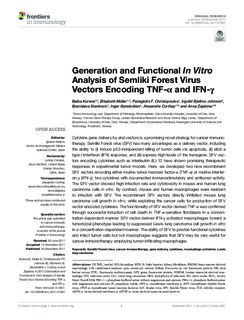| dc.contributor.author | Kurena, Baiba | |
| dc.contributor.author | Müller, Elisabeth | |
| dc.contributor.author | Christopoulos, Panagiotis | |
| dc.contributor.author | Johnsen, Ingvild Bjellmo | |
| dc.contributor.author | Stankovic, Branislava | |
| dc.contributor.author | Øynebråten, Inger | |
| dc.contributor.author | Corthay, Alexandre | |
| dc.contributor.author | Zajakina, Anna | |
| dc.date.accessioned | 2018-08-24T11:35:43Z | |
| dc.date.available | 2018-08-24T11:35:43Z | |
| dc.date.created | 2018-01-19T12:00:41Z | |
| dc.date.issued | 2017 | |
| dc.identifier.citation | Frontiers in Immunology. 2017, 8 . | nb_NO |
| dc.identifier.issn | 1664-3224 | |
| dc.identifier.uri | http://hdl.handle.net/11250/2559233 | |
| dc.description.abstract | Cytokine gene delivery by viral vectors is a promising novel strategy for cancer immunotherapy. Semliki Forest virus (SFV) has many advantages as a delivery vector, including the ability to (i) induce p53-independent killing of tumor cells via apoptosis, (ii) elicit a type-I interferon (IFN) response, and (iii) express high levels of the transgene. SFV vectors encoding cytokines such as interleukin (IL)-12 have shown promising therapeutic responses in experimental tumor models. Here, we developed two new recombinant SFV vectors encoding either murine tumor necrosis factor-α (TNF-α) or murine interferon-γ (IFN-γ), two cytokines with documented immunostimulatory and antitumor activity. The SFV vector showed high infection rate and cytotoxicity in mouse and human lung carcinoma cells in vitro. By contrast, mouse and human macrophages were resistant to infection with SFV. The recombinant SFV vectors directly inhibited mouse lung carcinoma cell growth in vitro, while exploiting the cancer cells for production of SFV vector-encoded cytokines. The functionality of SFV vector-derived TNF-α was confirmed through successful induction of cell death in TNF-α-sensitive fibroblasts in a concentration-dependent manner. SFV vector-derived IFN-γ activated macrophages toward a tumoricidal phenotype leading to suppressed Lewis lung carcinoma cell growth in vitro in a concentration-dependent manner. The ability of SFV to provide functional cytokines and infect tumor cells but not macrophages suggests that SFV may be very useful for cancer immunotherapy employing tumor-infiltrating macrophages. | nb_NO |
| dc.language.iso | eng | nb_NO |
| dc.publisher | Frontiers Media | nb_NO |
| dc.rights | Navngivelse 4.0 Internasjonal | * |
| dc.rights.uri | http://creativecommons.org/licenses/by/4.0/deed.no | * |
| dc.title | Generation and Functional In Vitro Analysis of Semliki Forest Virus Vectors Encoding TNF-α and IFN-γ | nb_NO |
| dc.type | Journal article | nb_NO |
| dc.type | Peer reviewed | nb_NO |
| dc.description.version | publishedVersion | nb_NO |
| dc.source.pagenumber | 21 | nb_NO |
| dc.source.volume | 8 | nb_NO |
| dc.source.journal | Frontiers in Immunology | nb_NO |
| dc.identifier.doi | 10.3389/fimmu.2017.01667 | |
| dc.identifier.cristin | 1547362 | |
| dc.description.localcode | Copyright © 2017 Kurena, Müller, Christopoulos, Johnsen, Stankovic, Øynebråten, Corthay and Zajakina. This is an open-access article distributed under the terms of the Creative Commons Attribution License (CC BY). | nb_NO |
| cristin.unitcode | 194,65,15,0 | |
| cristin.unitname | Institutt for klinisk og molekylær medisin | |
| cristin.ispublished | true | |
| cristin.fulltext | original | |
| cristin.qualitycode | 1 | |

